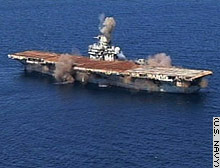Wednesday, May 24, 2006
Greenpeace and Oriskany

As the former aircraft carrier Oriskany just starts to settle in to her new role as an artificial reef, Greenpeace, on cue, weighs in on the action with a maneuver that can only be classified as “publicity seeking.” As explained by the story in the on-line publication, New Standard, the environmental organization has filed a Freedom of Information Act request (basically a request for any documents, notes, record of conversation, etc) related to the sinking. The resulting mound of paper will consume acres of Florida Panhandle pulp forests and weigh almost as much as Oriskany.
If the group was concerned about the potential environmental consequences of the sinking, their request seems a little late, unless they intend to insist that the Navy raise the ship as a mitigating measure. If there were problems, the time to act is before the sinking not after it. As such, I refer to this behavior as “publicity seeking, advertising, and position taking.” The strategy is fairly effective because it garners warm feelings toward the organization, which is often accompanied by a flood of financial support. The strategy has some fairly common elements.
- Don’t take any action to rally support to prevent the harm. Pre-emptive action may alienate valued members of your coalition.
- Wait until just before the start of the summer beach season (Memorial Day weekend) to raise the issue about the effect that the sinking may have on the safety of the beaches. I am surprised that their media campaign did not include Getty Images stock photographs of children playing on the beach with shovels and pails.
- Raise the issue of “carcinogens” to capitalize on people’s fear of cancer.
- Don’t provide any real evidence or even a theory of the pathway.
- Announce that you are not against sinking “per se” to create artificial reefs. But when you try to get them to specify conditions under which they would commit to reefing, you get vague and evasive responses such as ‘where environmentally appropriate’ which is their way of saying, ‘absolutely nothing, no where, at no time.’
We should not be too hard on Greenpeace and others on this last point. The primary role of interest groups in our public policy system is to block actions to which they are opposed. The values Greenpeace reflects are those of its staff and leadership, not of its mass membership. Staff-groups like Greenpeace masquerade as mass membership groups but effectively limit real participation to staff. “Staff” is a self replicating social network composed primarily of “true believers” which effectively limits opportunities for meaningful participation by the mass public. Realizing the public joins for reasons related to showing solidarity with the cause, which the organization rewards with material tokens of the association—calendars, day planners, espresso cups, t-shirts, posters, baseball caps and the like. Staff derisively refers to these members as “souvenir environmentalists.”
Maybe the staff believes that humans are an invasive species in the ocean realm, like so many noxious weeds that need to be eradicated and anything placed in the ocean to facilitate our recreation must therefore be evil. But I think our behavior indicates otherwise.
The article makes the point about how preparing a ship could not be cost effective under any circumstance. I would point them to the efforts of the San Diego Oceans Foundation in the reefing of the Canadian Defense Forces destroyer Yukon a few years ago. In an effort spearheaded by a non-profit organization, divers and others contributed thousands of hours of sweat equity preparing the vessel for reefing. It was a private investment that has yielded great returns in terms of economic value and recreational value.